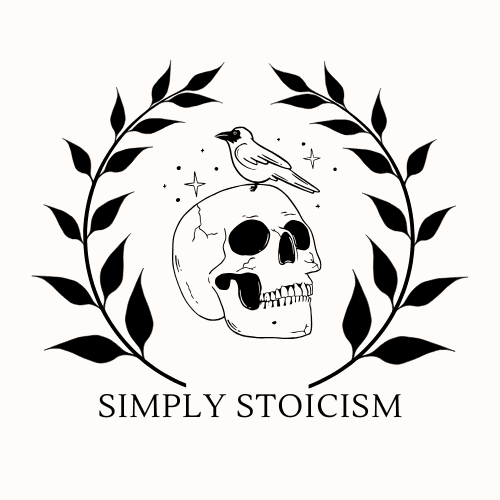Ancient Wisdom, Modern Psychology: Stoicism's Role in Mental Health
Ancient Stoic wisdom meets modern mental health science: practical tools from philosophy and psychology to build resilience and find inner calm.

Jon High
·
Jan 6, 2025
It's 3 AM. I'm a Junior in college. I shoot awake in bed with a panic attack: heart racing, thoughts spiraling, thinking I might be having a heart attack. After the longest 15 minutes of my life, I calmed down then opened my laptop and typed: "how to stop overthinking everything." Among the usual meditation apps and wellness articles, I found something unexpected – a quote from Marcus Aurelius written nearly two thousand years ago:
"The happiness of your life depends upon the quality of your thoughts."
Stumbling upon Meditations and that quote from Marcus Aurelius would lead me down a fascinating path where ancient wisdom and modern psychological science converge – revealing something remarkable about mental health that most people miss entirely.
The Surprising Connection
When people think about managing mental health today, they typically picture meditation apps, wellness retreats, or self-help books. But a growing body of research suggests that some of our most effective modern approaches to mental well-being have deep roots in ancient Stoic philosophy. In fact, the founders of Cognitive Behavioral Therapy (CBT), one of today's most evidence-based treatments for anxiety and depression, explicitly credit Stoic thinkers as their inspiration.
The Stoic Framework for Mental Health
The Stoics understood something fundamental about human psychology that science has only recently confirmed: our emotions don't come directly from events, but from our judgments about those events. As Marcus Aurelius wrote, "It's not events that disturb people, it is their judgments concerning them."
This insight forms the foundation of cognitive approaches to mental health. But the Stoics went further, developing a comprehensive framework for psychological well-being that remains remarkably relevant:
The Dichotomy of Control: Focusing our energy only on what we can influence
Cognitive Distancing: Separating our thoughts from reality
Values-Based Living: Aligning actions with core principles
Negative Visualization: Building psychological resilience
Present-Moment Focus: Maintaining awareness of the now
Each of these elements finds striking parallels in modern psychological interventions.
Modern Validation of Ancient Practices
Recent research has begun to validate these Stoic approaches scientifically. For example:
A 2019 study in the Journal of Positive Psychology found that practicing Stoic exercises for one week led to significant reductions in negative emotions and increases in life satisfaction.
Research on "cognitive defusion" – a modern technique remarkably similar to Stoic cognitive distancing – shows it effectively reduces anxiety and depression symptoms.
Studies on values-based interventions demonstrate their power in building resilience and meaning.
Practical Applications: Where Ancient Meets Modern
Let's explore how these Stoic principles translate into practical mental health strategies:
1. The Dichotomy of Control in Action
Modern anxiety often stems from trying to control the uncontrollable. The Stoic practice of carefully distinguishing what we can and cannot control provides immediate relief. Last month, facing a potential layoff at work, I used this practice to regain clarity:
Write down what's causing you stress
Draw two columns: "In My Control" and "Outside My Control"
Sort each element of your stressor into these columns
Focus exclusively on action plans for the "In My Control" column
In my case, while I couldn't control company decisions, I could update my resume, network, and improve my skills. This clarity reduced my anxiety significantly.
2. Cognitive Distancing for Emotional Regulation
The Stoics advocated observing our thoughts objectively rather than getting caught up in them. Modern psychology calls this "metacognitive awareness." Here's a practical approach:
When experiencing difficult thoughts:
Notice them as "just thoughts" rather than facts
Label them: "I'm having the thought that..."
Question their validity: "Is this thought helpful? Is it true?"
Consider alternative perspectives
For example, when I catch myself thinking "I'll never handle this project," I now recognize this as a thought pattern, not a fact, and can examine it more objectively.
3. Values-Based Living for Meaning and Purpose
Both Stoicism and modern psychology emphasize the importance of living according to our values rather than pursuing fleeting pleasures or avoiding discomfort. This approach helps build psychological resilience and meaningful satisfaction.
Try this values clarification exercise:
Identify your core values (what truly matters to you)
Rate how well your current actions align with these values
Make specific plans to increase alignment
Track progress and adjust as needed
Common Misconceptions and Pitfalls
It's important to note that embracing Stoic principles for mental health doesn't mean:
Suppressing emotions (both Stoicism and modern psychology advocate accepting emotions while managing responses)
Giving up on changing things (focus on effective action rather than wishful thinking)
Accepting abuse or mistreatment (Stoics advocated for justice and appropriate action)
A Personal Journey
I began exploring Stoicism after stumbling upon Meditations and that late-night anxiety episode, starting with just five minutes of morning journaling using Stoic principles. The impact was subtle at first, but as I continued the practice, I noticed significant changes in how I handled stress and uncertainty.
The daily habit of questioning my automatic thoughts and focusing on what I could control gradually rewired my response to challenges. When a major project failed six months later, instead of spiraling into self-doubt, I found myself naturally applying the dichotomy of control and looking for constructive next steps.
Looking Forward: The Future of Ancient Wisdom in Mental Health
As mental health challenges continue to rise globally, the integration of ancient wisdom with modern psychology offers promising directions for personal growth and resilience. Research institutions are increasingly studying Stoic practices, and the results consistently show their effectiveness for modern mental health challenges.
Practical Steps to Begin
If you're interested in exploring Stoic practices for mental health:
Start with morning reflection (a simple journaling practice)
Practice the dichotomy of control daily
Experiment with cognitive distancing
Read key Stoic texts alongside modern psychological resources
Join online communities focused on practical Stoicism
Wrap Up
The convergence of ancient Stoic wisdom and modern psychology isn't just an interesting historical connection – it's a practical pathway to better mental health. By understanding and applying these time-tested principles within the context of modern psychological science, we can build more effective, sustainable approaches to mental well-being.
Remember: The goal isn't to choose between ancient wisdom and modern science, but to harness the power of both. As Marcus Aurelius might say if he were writing today, "The best approach is the one that works – regardless of whether it comes from ancient philosophy or modern psychology."
The journey toward better mental health is both universal and deeply personal. Whether you're just beginning to explore these ideas or deepening your existing practice, remember that humans have been grappling with these challenges for millennia – and we've been finding solutions for just as long.
What matters isn't where the wisdom comes from, but how effectively we can use it to live better lives. The Stoics knew this, modern psychologists know this, and now you know it too.
Start small, stay consistent, and remember: every step toward better mental health is a step worth taking.



